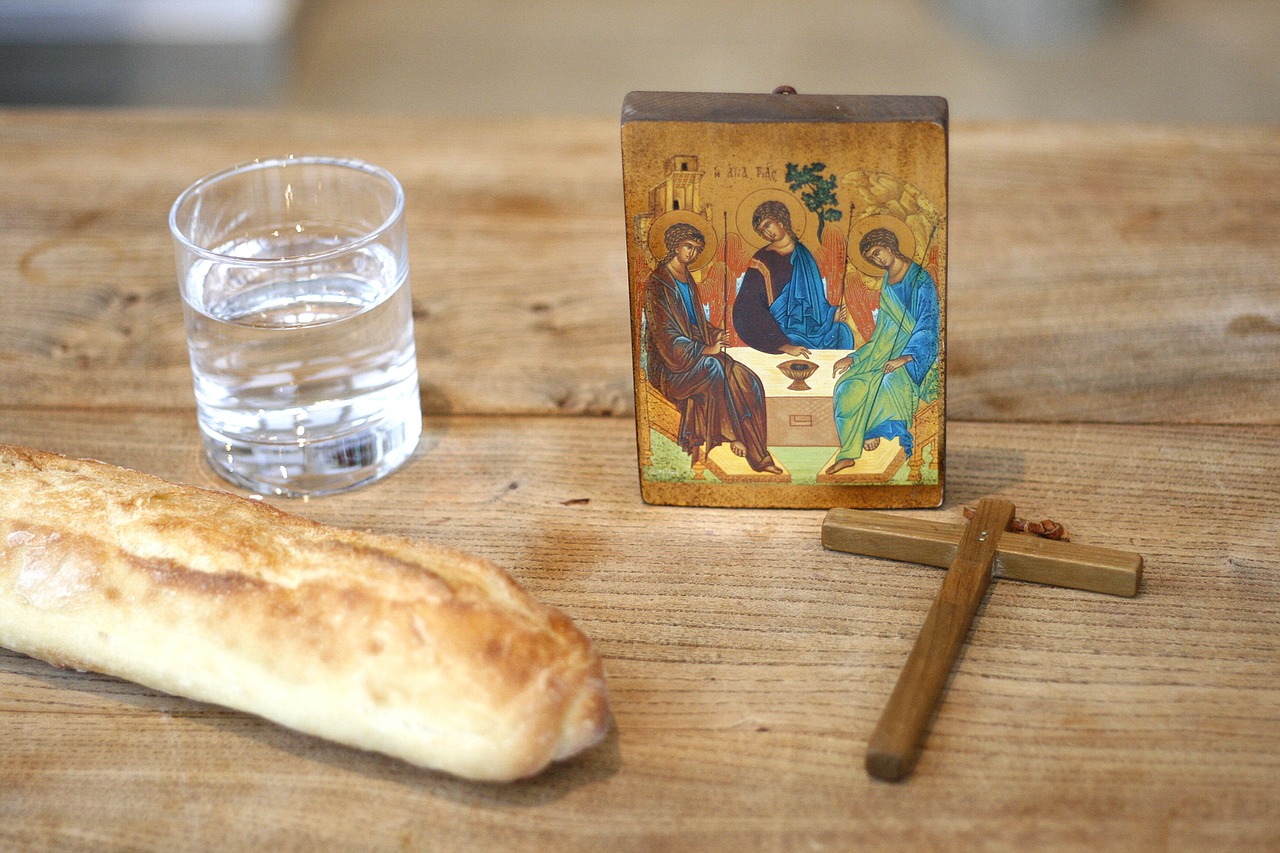To the rest I say, not the Lord, that if any brother has a wife who is an unbeliever, and she consents to live with him, he should not divorce her. If any woman has a husband who is an unbeliever, and he consents to live with her, she should not divorce him. For the unbelieving husband is consecrated through his wife, and the unbelieving wife is consecrated through her husband. Otherwise, your children would be unclean, but as it is they are holy. But if the unbelieving partner desires to separate, let it be so; in such a case the brother or sister is not bound. For God has called us to peace. Wife, how do you know whether you will save your husband? Husband, how do you know whether you will save your wife?
I Corinthians 7:12-16
An exciting new unit of study and reflection is coming in two weeks! For these next two weeks, outside of weekends and feast days, I’m reaching into the “Prayer Team Mail Bag” to address questions that some of you have sent to me in the last few months. If you ever want to submit a question, please free to do so.
Today’s questions concern interfaith marriage. In I Corinthians 7:12-16, is St. Paul suggesting marriage to one who doesn’t believe or maybe believes in a different way (Jew v. Gentile—or modern day Orthodox v. other Christian denomination) is okay? Is this more targeted for when someone in a marriage finds Christianity after they are married and the spouse does not follow? Do you have advice for how to navigate an interfaith relationship (still Christian-Christian, just not Orthodox-Orthodox)? Or the best way to introduce someone to the faith—specifically from an existing Christian (non-Orthodox) background?
The first thing I want to do is define the terms “faith” and “religion.” For purposes of this reflection, “faith” is our belief system—Christian, Jewish, Muslim, Hindu, etc. There are a small number of faith traditions. “Religion” I will define here as to how one practices the faith. There are nearly 40,000 Christian denominations, 40,000 different expressions of the Christian faith. So, my faith is Christian, my religion is Orthodox because Orthodoxy is how I express my Christian faith.
Second, we have to acknowledge that St. Paul was writing to the people of his time. Much of what he said is applicable still to our time, though some is not. At the time, there were people who were married, who were Gentiles, and one of the couple found Christianity and became a Christian. I believe that this is the meaning of what St. Paul wrote that if a man or a woman is married to an unbeliever, let them not get divorced, because perhaps one will bring the other to salvation. I don’t think the intention here is to say that one who is already a believer should marry someone who is not.
It is the practice of the Orthodox Church that for one to be married in the church, one partner must be Orthodox and the other must be a Christian baptized in the name of the Holy Trinity. Thus, we allow for “inter-religious” marriage (marriage between Orthodox and other Christian) but we do not allow for “inter-faith” marriage (marriage between Orthodox and non-Christian). Why? The simple answer is that the number one goal of life is to work towards salvation. The number one goal then in marriage is to work toward mutual salvation—the husband and wife work together towards mutual salvation, the salvation of both of them. If one party is not Christian and not working towards salvation, then the two parties are running towards different endings. How then can an Orthodox spouse be encouraged in their journey to salvation by someone who doesn’t believe in salvation? The second reason why this doesn’t work is the marriage service itself—when a couple is crowned in the name of the Holy Trinity, how can this happen over someone who doesn’t believe in the Holy Trinity? As a priest, even if it was allowed, I would feel like I am defiling or violating someone else by imposing something on them that they don’t believe in. An Orthodox/non-Christian marriage is not allowed.
So let’s move to inter-religious marriage (Orthodox with other Christian). This is allowed but can present challenges. Both spouses are moving towards salvation, and that’s good. But they are moving in a slightly different way (or maybe significantly different). Will they worship together, or go their separate ways each Sunday? Will they worship in one church one week and the other church the next week? What is it like when they worship together but one spouse receives Holy Communion while the other does not? And what happens when children come along? These issues bring challenges. The issue of Holy Communion is challenging. The Orthodox do not allow non-Orthodox to receive Holy Communion, while other denominations welcome everyone to receive. And raising children to be both Orthodox and something else will most likely result in confusion and perhaps in the children ending up outside of Christianity. Certainly, these are important issues to be discussed EARLY ON when dating. If the faith is central to our lives, it needs to be out in front when people are dating, and not just come up when the relationship is at the point of discussing marriage. I’ve seen lots of people have great heartache because they didn’t bring up the faith until very late in the dating relationship. I also know lots of people who are married where one spouse is Orthodox and the other is not and they work hard at being committed Christians, sometimes even going to two churches. This requires patience, sensitivity, and grace, but it can work. The children, however, have to be baptized in one church and have one denomination as their primary Christian identity. In marriages of people I know where one is Orthodox and the other is a non-Orthodox Christian, where both are committed Christians, they have agreed to raise the children in one church, and not always the Orthodox one.
As for how to navigate an inter-religious (Orthodox with other Christian) relationship, again, it is important to put one’s convictions on the table early. If it is critically important that you marry someone who will become Orthodox, that needs to be on the table early in the relationship. Sure, it can be spoken, but most importantly, it must be modeled. It’s hard to tell someone “Orthodoxy is the most important thing to me” if he or she does not go to church, is never seen praying, does not keep the fasts, etc. Rather than tell someone that going to church every Sunday is important, actually go to church each Sunday and the person you are dating will hopefully figure out quickly that it is important to you. Again, if marrying someone who is Orthodox is important to you, and you are dating someone who isn’t Orthodox, that is something you need to be upfront about before you get too deep into dating.
It’s challenging to live the Orthodox life while dating, as modern dating practices seem to require pre-marital sex and cohabitation. It will be very hard to convince someone that Orthodoxy is important to you if you fall into these two practices.
As for how to introduce someone to the faith, specifically from an existing Christian (non-Orthodox) background, here are a few ideas:
1. Pray about it—that is the first thing we should do when confronted with any challenge.
2. Make sure you are knowledgeable about Orthodoxy. Someone who is very convicted about their denomination is not going to be attracted to Orthodoxy if you are not knowledgeable about it. Consider taking a catechism or Orthodoxy 101 class together.
3. Make sure you are modeling Orthodoxy by going to church on Sundays.
4. Take your non-Orthodox partner to a church that does English—this is key. It is hard enough to introduce someone to a different religion, let alone one that is done in a different language.
5. Sit down and talk to an Orthodox priest. This will make the leader of the church more human to the one who is outside of Orthodoxy.
6. Consider talking to a priest who is a convert to Orthodoxy. There are several (private message me and I’ll give you some names) who have come into the faith and are now serving as Orthodox priests. Or talk to someone else who is a convert to Orthodoxy. Hearing about their journey will be helpful.
Lord, bless everyone who is reading this message today, in whatever situation they find themselves in. Some are dating, some are married, some are having a challenge integrating their Christianity into both. Some know others who face these challenges. And all of us, married or not, face challenges in living out our faith. Lord be with us in our respective lives and their respective challenges, so that we may grow ever closer to You, in all that we are doing. The number one goal for life is salvation. Be with us all in that journey today. Amen.
I appreciate that it is a challenge to bring someone into Orthodoxy. The best thing to do is to be convicted in your Orthodoxy, and pray that the person you are dating will appreciate that.



